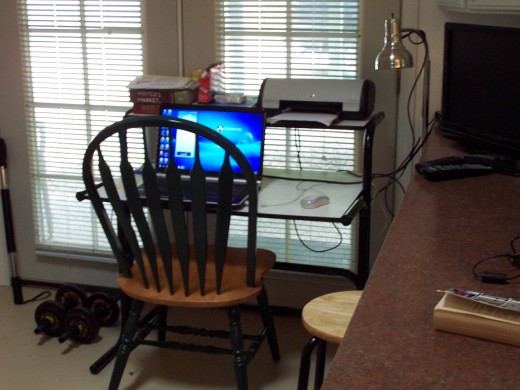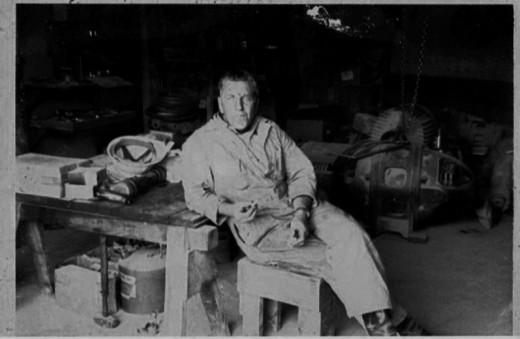The Writer's Mailbag: Installment 225
Remembering Back
Random thoughts stop by from time to time, thoughts about what I believe was an easier time to grow up . . . I’m referring to my childhood, of course, in the 50s and 60s. Oh sure, there were many of the same societal issues then as there are today . . . abuse, alcoholism, poverty, prejudice . . . but for whatever reason, and maybe that reason was denial, it just seemed more peaceful then, more straightforward then, and less muddled.
Anyway, I was thinking about that this week as I pondered a seemingly impossible task list. How in the hell was I going to finish everything I had scheduled? What should I do first? What was I going to do if I didn’t complete the to-do list? And I found myself so busy fretting over it all that by Monday mid-morning I had accomplished nothing at all.
That’s when I remembered back to a time with my dad, circa 1965, and I was lamenting one day about the busy week facing me, same questions, same level of fretting, and Dad, in his infinite wisdom and his bull-in-a-china-shop mentality, simply told me: “Bill, what I do know for certain is not a damned thing is going to be done with you sitting on the couch thinking about it. Get off your butt and start in on that list.”
He was correct then and his words of advice are correct now.
Let’s do this!

Editing Apps
From Eric: “Bill I am kind of tired having to look up words in a dictionary. My automatic edit, just as here, discount and don't know a danged complicated word. (I do believe that the concept of grammerly (sp) is just plain added to the list of sins) Note please that there is no correction for "grammerly". So what are your thoughts on this? My phone is great in making a quick note to another. I think that is OK in texting, which I do about 1 time a day. (exception when mom gives a honey-do-list) But seriously, do you use such editing mechanics?”
Eric, it’s time for a confession: I use no editing tools at all. I have no editing apps on my phone or computer or wherever. I’m kind of an old-fashioned boy.
What I do have, however, are voices whispering inside my head, the voices of Mister Jahner in Sophomore English, and Sister Mary Elizabeth in 4th Grade. They taught me grammar many years ago, and those lessons stuck with me. I trusted them then and I trust them today, just as I trust an old-fashioned dictionary and an old-fashioned thesaurus.
Just call me a dinosaur!
Seriously, most of the grammar I learned many years ago stuck. There are times, like when someone asked me recently about using “that” and “which,” when I have to do some research for the correct answer, but by and large I remember enough to get by.

More on Backstory
From Venkatachari M: “I am confused with that backstory question and answer. If it is a narrative story, is there the possibility of some backstory in it? Suppose a story centers around one main character and you tell the story chronologically from birth to death of that character. You will present all those characters involved in his life as and when the situations demand. Do you call the presentation or description of their features or the characteristics and the relationship with the main character as a backstory?”
Venkatachari M, you managed to mention the one time, I know of, when backstory and story merge into one. In the case you are referring to, there is no need to worry about adding backstory. A chronological biography, auto-biography, or chronological novel will, by their very nature, handle all backstory quite nicely.
Nice job of finding a loophole in the general rule.
My Voice, Not Yours . . . What Is Too Much Editing?
From Shannon: “But anyway.... I majorly digress. It's interesting to read the comments about reading. I do love to read. I just try not to be influenced too much by another author's style to the point it stalls me. That's the tricky part of editing, too, when I am not the editor. At what point does it no longer feel like my voice speaking and when is it still my voice but better?”
Shannon, this really is an interesting question, and I’m not sure there is a clear-cut answer to it. I believe you are referring to over-editing, or at least that’s how I read your question and yes, in my opinion, it is quite possible to edit too much and thus lose rhythm, flow, and voice in the process.
My opinion on this, especially with creative writing/ novels/short stories, is that proper grammar is simply an aid and not something that is mandatory. I break grammatical rules all the time in my novels and for the very reason you mention.
Here’s the process I use: I correct glaring grammatical and spelling errors. I then read the story/novel out loud to see if the flow and voice are as desired. I then sleep on it for awhile, and then I return to it once more for a final read-through. After that I turn it over to the literary gods and I’m done with it. Do I miss things by taking that approach? Yes! Is it terribly important to me that I miss some things, or ignore some grammatical errors? No! For me, and this is just me speaking, rhythm, flow, and voice are crucial in good storytelling, so I’m willing to risk the wrath of the writing gods.
I hope that helps!

So There You Go, Dad!
One item checked off the to-do list, thank you very much. Now I’ll move on to the next, and then the next, and, well, as Mom would say, “it will all come out in the wash!”
Since it is now Monday when you are reading this, I wish you all a smooth and productive week of writing and of life. Remember, nothing gets done until you take that first step.
Just sayin’
A Glimpse at the Future
How would you like to read a short excerpt from my upcoming novel “The Magician’s Shadow?”
It continued for the better part of two hours. The three supervisors knew nothing, suspected nothing, and had nothing of value to tell us. We told Parsons as much and then asked if we could interview Burt Slocumb, the mechanic involved with Janice Janey. Slocumb joined us five minutes after the request.
He was forty-two according to his employee file, a native of Olympia, born and raised, a graduate of Olympia High School, nothing special about him, pretty average in appearance, short-brown hair, a bit of a beer-belly, pockmarks from a childhood disease. His handshake was weak, his smile weaker when he sat down opposite us.
Before Liz could ask her first question Striker walked across the room, from his guard post at the door, pulled up a chair, sat down opposite Slocumb, pulled out his Desert Eagle, and placed it on the table.
The Desert Eagle is an impressive handgun. It is large and it looks deadly. Four-point-four pounds, a six-inch barrel, it is exactly what it appears to be, a killing machine.
“Burt,” Striker said. “Why are you vandalizing the buses?
Not a sound in the room. No one moved. The only movements were Slocumb’s eyes as they darted from Striker to the Desert Eagle. Back and forth, back and forth, he must have done it five times while sweat broke out on his upper lip.
“Burt,” Striker continued. “I’m not in the habit of repeating myself, but I’m going to do it just this once. Pay attention to me now, Burt. This is your one chance to walk out of this room on two legs, so answer wisely. Why are you vandalizing the buses?”
Plato said that courage is knowing what not to fear. If that is true, I might add that wisdom is knowing what to fear. Slocumb made the right decision. When all that separates you from Striker’s impatience and bad temper are two feet of cheap wood, the only decision possible is to simply fold your hand and toss in your chips.
“I should have gotten a promotion instead of that asshole Barker. They ignored my time and service and went with someone younger. It pissed me off, damn it. I’ve got overdue bills, and my ex is riding my ass about past-due child support,” Slocumb managed to say with trembling lips.
“Life sucks,” Striker said as he stood, picked up his Desert Eagle, tucked it in its holster, and headed for the door. “I’ll meet you two in the car. This guy stinks of fear and I feel like I’m going to gag.”
2018 William D. Holland (aka billybuc)
“Helping writers to spread their wings and fly.”








